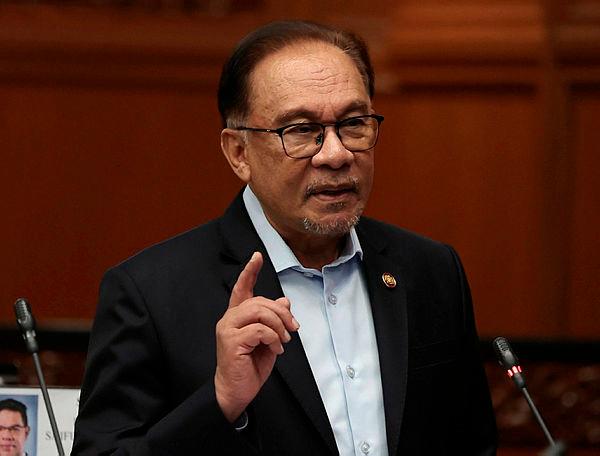KUALA LUMPUR: Datuk Seri Anwar Ibrahim in his first year as Malaysia’s 10th Prime Minister has showcased an impressive pace in diplomatic engagement, reflecting his commitment to restoring Malaysia’s reputation for international advocacy and engaging in proactive regional diplomacy.
Since assuming office on Nov 24, 2022, the 76-year-old premier’s proactive approach to global issues and regional affairs has garnered praise from many quarters, surpassing the diplomatic pace set by his predecessors.
Anwar’s dedication is evident in his extensive diplomatic tour covering countries such as Indonesia, Brunei, Singapore, Thailand, Turkiye, the Philippines, Saudi Arabia, Cambodia, Laos, Vietnam, China, United States (US), United Arab Emirates (UAE), and Egypt.
This relentless pace is a clear demonstration of Anwar’s commitment to regaining Malaysia’s international stature, notably reflected in his decision to strengthen bilateral ties with Southeast Asian neighbours through his first official foreign visit to the Indonesian capital of Jakarta from Jan 8-9.
Geostrategist Prof Dr Azmi Hassan in commending on Anwar’s first year as prime minister praised the Malaysian premier’s diplomatic demeanour.
“In terms of diplomatic engagement, I would say Datuk Seri Anwar is very approachable, pragmatic, and very diplomatic. I guess added with his aura, he has been doing very well at the international stage and also regional stage, whether be it Indo-Pacific or Asia-Pacific or South-East Asia,” he told Bernama.
Azmi highlighted Anwar’s many diplomatic initiatives in a short span including upholding ASEAN centrality, addressing the Myanmar crisis, southern Thailand conflict and delicately handling the South China Sea issue, setting him apart from his predecessors.
Prior to this, Anwar wanted to continue to pursue robust relations with both China and the United States (US) without being pushed to choose one side or the other, adding that engaging both major powers provides Malaysia with more strategic space to advance its national interests.
Anwar was often complimented for his emphasis on intraregional and institutional opportunities in trade and investment in the face of US-China rivalry.
“Regarding whether Malaysia is with the Americans or the Chinese, I believe our policy is positioned in the middle, or if I may say, it is very neutral. We are neither with the United States nor with China, but we maintain a friendly stance with both sides because it benefits us,“ said Azmi.
The geostrategist also emphasised the importance of face-to-face meetings for conveying Malaysia’s stability and attractiveness for investments, noting that Anwar’s approach has been effective in conveying ideas and requests to other world leaders.
Notably, Anwar has been vocal in supporting the Palestinian cause from the start condemning Israel’s attacks at international platforms like the Asia Pacific Economic Cooperation (Apec) Economic Leaders’ Week Informal Dialogue and Working Lunch held in US, recently.
During the meeting, Anwar stunned leaders by condemning Israel’s attacks on Palestine and calling for a ceasefire in the presence of US President Joe Biden, a strong ally of Israel, and the rest of the leaders from member economies.
A joint statement by the leaders of Malaysia, Indonesia, and Brunei was also issued during APEC calling for an immediate ceasefire and sustained humanitarian truce in Gaza, showing how serious Malaysia and its two immediate Muslim neghbours were on the plight of the Palestinians.
Anwar has also consistently raised the Palestinian issue at various international gatherings, including the United Nations General Assembly, ASEAN Summit, the inaugural ASEAN-Gulf Cooperation Council (GCC) Summit, and the Joint Arab Islamic Extraordinary Summit.
He also participated in the 8th Extraordinary Islamic Summit of the Organisation of Islamic Cooperation (OIC) in Riyadh, Saudi Arabia which was held to address the Israeli aggression, cruelty, and inhumanity in Palestine.
Besides the Palestinian issue, Anwar’s warm ties with Turkish President Recep Tayyip Erdogan have received praises of many, particularly his friendly gesture undertaking a personal visit to Turkiye to show support for earthquake victims in February.
Anwar, describing Erdogan as a personal and family friend, commended Turkiye as a modern and progressive Muslim country that could play constructive roles in international affairs.
Another significant milestone on Anwar’s diplomatic tour was his four-day official visit to China in April, where he met Chinese leaders including President Xi Jinping.
Describing the visit as an achievement bringing great benefits to the country, Malaysia secured RM170 billion (US$51.2 billion) worth of investment commitments from China through 19 memoranda of understanding signed between businesses in both countries, especially in green technology and the digital economy sectors.
In addition to Anwar’s outbound diplomatic efforts, Malaysia hosted notable leaders from key countries during his first year in office, including German President Frank-Walter Steinmeier, besides several high-level visits from Australia, Saudi Arabia, Singapore, UAE, Indonesia, India, the Philippines, Hong Kong, Timor Leste, Brunei, New Zealand, Thailand, the Netherlands, Japan and the latest highlight was the inaugural state visit of Prince Albert II of Monaco from Nov 26 to 29.
Anwar is expected to end his 2023 diplomatic tour by attending the ASEAN-JAPAN Commemorative Summit from Dec 16 to 18.
The Malaysian premier’s first year in office reflects a robust diplomatic agenda, signalling Malaysia’s resurgence on the global stage under his leadership.–Bernama









